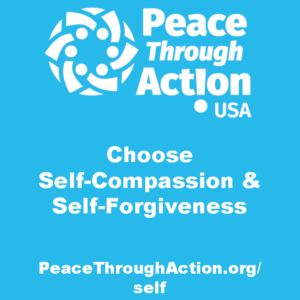What are Self-Compassion and Self-Forgiveness?
Forgiving yourself means letting go of the feelings and emotions associated with what went wrong. You let go of any resentment or anger toward yourself, your situation, and anyone else involved. Once you let go and forgive these harsh feelings, you open yourself up to self-compassion, recognizing that you are a human being and making mistakes is just a part of our life journey, and will only help us to grow. Self-compassion is the realization that making mistakes does not make us “bad” or “less human” but is rather an understandable and natural part of the human experience.
Self-compassion is a relatively new construct in psychological literature, but has for centuries, been central to Buddhist philosophy. Forgiveness, compassion, and acceptance have been described as among the “sisters of mindfulness,” that is, interconnected forms of mindfulness and mental strengths that are tenets of Buddhist psychology.[1] However, regardless of its spiritual origin, self-forgiveness and self-acceptance are critical tools for all to implement on the path for a peaceful mindset and peaceful lifestyle.
[1] Williams, E. (2015, August). Self-Compassion and Self-Forgiveness as Mediated by Rumination, Shame-Proneness, and Experiential Avoidance: Implications for Mental and Physical Health. Electronic Theses and Dissertations. Paper 2562. https://dc.etsu.edu/etd/2562
How do people learn Self-Compassion and Self-Forgiveness?
But, of course, forgiveness is a process. We cannot instantaneously force ourselves to forgive—and forgiveness happens at a different pace for everyone and is dependent on the particulars of any given situation.
What we can do is create space for ourselves to forgive. Once we are honest about our feelings, we can invite ourselves to consider alternative modes of viewing our pain and can see that releasing our grip on anger and resentment can actually be an act of self-compassion.[2] Self-compassion is the extension of this forgiveness and understanding to yourself. Instead of mercilessly judging and criticizing yourself for various inadequacies or shortcomings that may have led to the forgivable event, self-compassion means you are kind and understanding when confronted with personal failings. After all, who ever said you were supposed to be perfect?[3]
[2] Salzberg, S. (2021, November 23). Practice Self-Compassion with Forgiveness. Mindful. https://www.mindful.org/practice-self-compassion-with-forgiveness/
[3] Neff, K. (2020, July 9). Definition and Three Elements of Self Compassion. Self-Compassion. https://self-compassion.org/the-three-elements-of-self-compassion-2/
How do people implement Self-Compassion and Self-Forgiveness?
Self-compassion involves acting the same way towards yourself when you are having a difficult time, fail, or notice something you don’t like about yourself. Instead of just ignoring your pain with a “stiff upper lip” mentality, you stop to tell yourself, “This is really difficult right now,” how can I comfort and care for myself in this moment?[4]
Several things happen when you take steps to forgive yourself. You accept responsibility for what happened. You express remorse, guilt, or other similar emotions that point out that what you did was wrong or unacceptable. You make amends with yourself while restoring self-trust. It helps to form confidence and focus your thoughts on taking better actions in the future along your self-esteem and well-being journey.[5]
Self-forgiveness and self-compassion begin at the self, after a decision is made to let go of the harmful emotions associated with the triggering event and to relinquish blame against oneself.
[4] Ibid.
[5] What’s Self-Forgiveness: Why It’s Important For You. (2022, July 10). BetterHelp. https://www.betterhelp.com/advice/self-esteem/what-is-self-forgiveness-and-why-is-it-important-to-your-mental-health/
For what types of circumstances are Self-Compassion and Self-Forgiveness suited?
Self-compassion and self-forgiveness are well suited for repairing the long-term harm that results from aggression and violence.
Do Self-Compassion and Self-Forgiveness work for preventing or controlling aggression or violence?
Self-compassion and self-forgiveness can help to prevent aggression or violence. The more we practice the process of forgiveness and compassion, whether to ourselves or to others, we build a foundation of mindfulness, grounding, and a higher capacity for letting go.
Where else might I go to learn more about Self-Compassion and Self-Forgiveness?
- Mindful— Practice Self-Compassion with Forgiveness
- American Psychological Association— Don’t cry over spilled milk—The research on why it’s important to give yourself a break
- The Greater Good Science Center at the University of California, Berkeley— What Is Forgiveness?
- BetterHelp— Self-Forgiveness: It’s Important For You
Information Sheet-Choose-Self-Compassion and Self-Forgiveness (PDF)
Have a suggested improvement to this information sheet? Send it to inbox@peacethroughaction.org
Do Something Right Away to Increase Peace
Subscribe to our YouTube channel
Give a gift of money to support our mission delivery activities
Choose opportunities to take part in our #PeaceBeginsWithWe campaign

